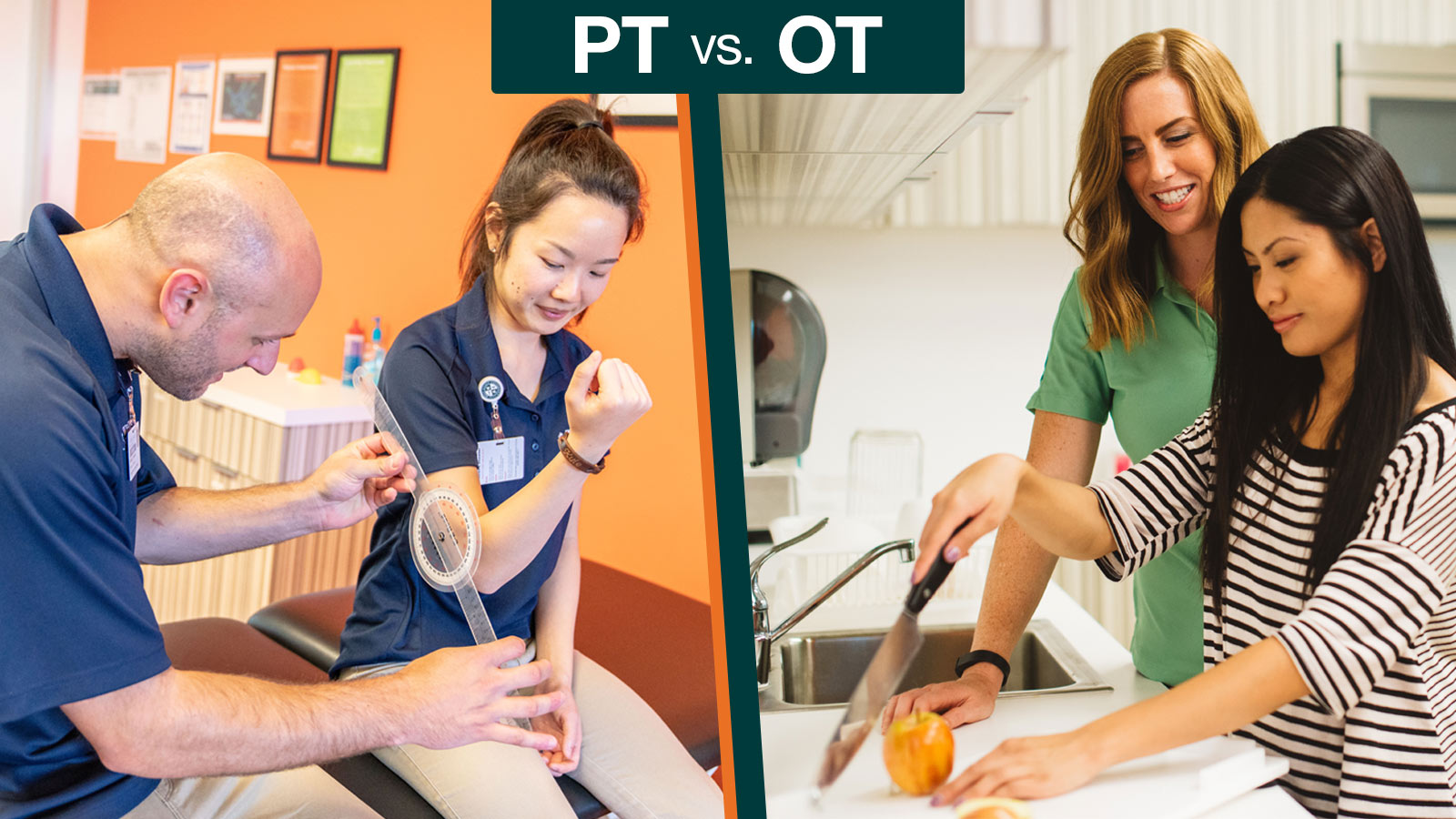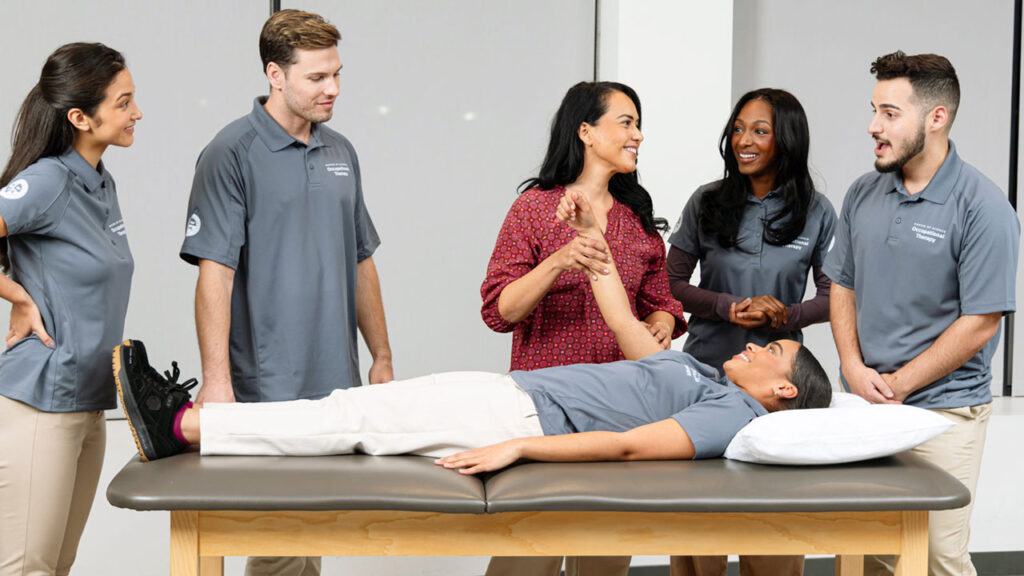If you’re considering a career in movement and mobility healthcare, it’s possible you’re torn between becoming an occupational therapist (OT) or a physical therapist (PT). It’s even possible that, early in your search for a degree program, you aren’t yet familiar with the differences between the two.
Both professions have a meaningful impact on patients that can significantly enhance quality of life. Both address movement and mobility of the body. But the particular objectives, methodologies and patient outcomes of OTs and PTs are distinct and designed around distinctive healthcare needs.
To better understand the difference between an OT and a PT, we’ve provided an overview of each: what they do, what they study, and how to become one. Then we’ll do a comparison between the two.
Let’s start with occupational therapists:
What Is an Occupational Therapist (OT)?
Occupational therapists (OTs) are skilled healthcare professionals who help patients with motor-function challenges gain greater autonomy in their daily lives, including at work, home, and school. They also treat developmentally disabled patients to help develop organizational and social coping skills.
In practice, OTs work with a wide range of populations who have permanent disabilities that affect movement and daily function, from patients with conditions such as cerebral palsy to older patients whose mobility has become limited with age. Often, this work involves educating and acclimating patients to the use of assistive and adaptive medical equipment and technology, like wheelchairs or eating devices.
In order to become a practicing OT, you must earn a Master of Science in Occupational Therapy (MSOT). An MSOT course of study includes academic, clinical, and research coursework in topics that typically include occupational performance, evidence and technology, wellness interventions, and fieldwork.
You can also choose to go beyond the master’s level OT program to earn your Occupational Therapy Doctorate (OTD). An OTD program focuses on the integration of scholarly knowledge in professional practice, providing students with a deepened engagement with practice skills, innovation, occupational therapy and occupational science theory, and research.
For a more complete look at OT courses, you can view WCU’s MSOT curriculum and/or OTD curriculum.
Once you complete OT school, you must pass the National Board of Certification in Occupational Therapy (NBCOT®) Occupational Therapist Registered (OTR®) exam and any additional state-required certification in order to begin licensed practice.
We invite you to read our dedicated Guide to Occupational Therapy, with more details on an occupational therapy degree, OT jobs and what they entail, MSOT/OTD specialties and more. If you’re eager to start your OT career, we invite you to start your application now.
What Is a Physical Therapist (PT)?
A licensed physical therapist is a Doctor of Physical Therapy (DPT). These professionals work with patients with injury, illness, or disability. DPTs evaluate, diagnose, develop treatment plans, and implement a course of treatment for each patient. Treatment is designed to rehabilitate or improve mobility, and sometimes to help manage pain. A course of treatment designed by a PT may include massage, exercises, water and light therapy, electrical stimulation, and more.
To begin practice as a physical therapist, you must first earn a DPT. This advanced degree includes academic, clinical, and research study in topics including biology, health science, psychology, physiology and athletic training. For a more comprehensive look at a DPT course of study, you can view WCU’s DPT curriculum.
Before they can begin licensed practice, DPT graduates are required to pass the Federation of State Boards of Physical Therapy National Physical Therapy Exam (NPTE®) and obtain any additional state- or specialty-required certification and licensure.
Check out our detailed DPT program page for additional insights or you can start your application now.
OT vs. PT Breakdown: Similarities and Differences
Now that we’ve taken a look at these two meaningful professions separately, let’s talk about how they differ. In summary: An occupational therapist helps patients with mobility as it relates to tasks and daily activities, like eating and driving. A physical therapist, on the other hand, provides rehabilitative treatment to restore things like range of motion and strength.
Below we’ve provided an at-a-glance look at some of the primary differences between an OT and a PT, both in education and profession:
A Snapshot of MSOT, OTD, and DPT Degrees
| MSOT | OTD | DPT | |
| Program Type | Master’s Degree | Doctoral Degree | Doctoral Degree |
| Length of Study* | 24 Months | 32 Months | 36 Months |
| Licensure Requirements | NBCOT® Board OTR ® Exam State-Required Licensing | NBCOT® Board OTR ® Exam State-Required Licensing | NPTE® Board Exam State-Required Licensing |
| Treatment Arenas | Motor-function challenges for permanent conditions | Motor-function challenges for permanent conditions | Mobility improvement and pain management for injury and illness |
| Employment Environment** | Hospitals, private practice offices, schools, home healthcare, nursing home facilities | Hospitals, private practice offices, schools, home healthcare, nursing home facilities | Private practice offices, hospitals, home healthcare, nursing home facilities, self-employment |
**U.S. Bureau of Labor Statistics 2022 data.
Explore WCU’s Programs for Aspiring OTs and PTs
Now that you know more about the career that awaits you as a physical therapist or occupational therapist, are you ready to choose the path that’s right for you? West Coast University offers a Los Angeles MSOT program, OTD program, and DPT program at our Center for Graduate Studies. Enrollment is currently open for these programs.
WCU campuses are designed and equipped with industry-current facilities and simulations labs to prepare our students with hands-on practice in realistic educational healthcare environments and scenarios, educated by expert faculty.
Ready to take the next step? To begin your journey, call us at (866) 508-2684. We’re here to answer questions and help you understand your education options.
Frequently Asked Questions: Comparing Occupational Therapy and Physical Therapy Careers
Q: How do the work environments differ for occupational therapists and physical therapists?
A: While there’s overlap, OTs and PTs often work in slightly different settings. According to the U.S. Bureau of Labor Statistics (BLS), both can work in hospitals, private practices, home healthcare, and nursing facilities. However, OTs are more likely to work in schools, while PTs have more opportunities for self-employment.
To learn more, check out the latest BLS on occupational therapists and physical therapists.
Q: How do the educational requirements differ between OTs and PTs?
A: Occupational therapists typically need a Master of Science in Occupational Therapy (MSOT), which takes about 24 months to complete. Physical therapists require a Doctor of Physical Therapy (DPT), usually a 36-month program. For OTs interested in advanced practice, research, and leadership roles, OTD programs offer a doctoral-level education in 32 months.
Q: What are the licensing requirements for OTs and PTs?
A: Occupational therapists must pass the National Board of Certification in Occupational Therapy (NBCOT®) Occupational Therapist Registered (OTR®) exam. Physical therapists are required to pass the National Physical Therapy Exam (NPTE®). Both professions also need to meet any additional state-specific licensing requirements.
WCU provides career guidance and assistance but cannot guarantee employment. The views and opinions expressed are those of the individuals and do not necessarily reflect the beliefs or position of the school or of any instructor or student.



